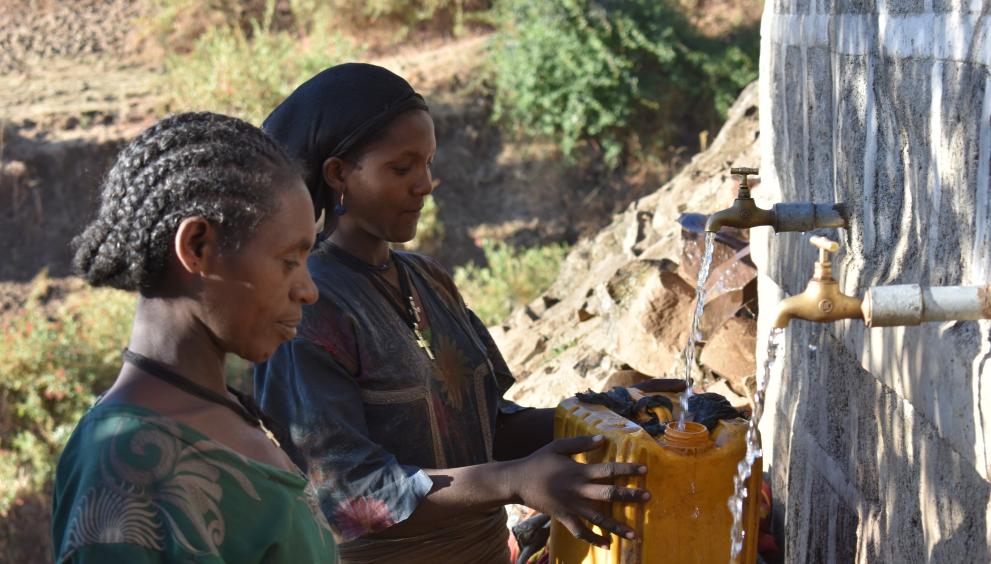
It's early morning but Denkayehu Kassahun and Enbere Fentaw, two neighbourgs, are already on their way to the Gurumba Spring water-point in the highlands of Sekota, Amahara region of Northern Ethiopia. In 2017, this water-point was constructed by DanChurchAid (DCA) in collaboration with the local NGO Mekene Yesus (EECMY-DASSC) in the framework of the EU project Resilience Building and Creation of Economic Opportunities in Ethiopia (RESET II).Together they go to the water point every morning, luckily only being ten minutes away from where they live, compared to the over one hour’s journey before the construction of the water point (corresponding to 5km). Twice a day the two neighbours come to the water point and fill up the yellow plastic jerry-cans they carry on their backs. The jerry-cans can carry around 20 liters of water, and when asked Enbere smiles and says, "They are a bit heavy, but we are used to it and it keeps us warm to carry the jerry-cans. Life is easier now that the water isn’t far away."
Before the construction of the water point, the water they collected was unprotected, meaning that the people would collect the water directly from the ground, and use the same water accessing point as their cattle. Consequently, the springs were easily contaminated by human and animal induced bacteria, causing various stomach diseases to flourish in the area, also due to open-defecation. "Before the water was brown, dirty and far away. Our animals would drink from the same place, where we would collect the water and our children would get sick of drinking the water. Now the water is clean, and close to where we live," says Denkayehu proudly when asked about the biggest change the Gurumba Spring has brought to herself and her family.
Denkayehu has never been schooled, and therefore lives off farming the small land that she owns. Her husband died of an illness several years ago, since they didn’t have the money to go to a doctor. Therefore, she has brought up her four children (one girl and three boys) on her own, struggling to bring food to the table. Her eldest son migrated over a year ago, and when asked about him, she said: "I don’t know where my son is. If he is dead or alive, or even how far away he is, I don’t know. He left because I couldn’t provide food for him. Living here is very hard. My three other children help me with the work, when they are not in school. I am so happy that they go to school, since I don’t know how to read or write". Denkayehu’s story represents many lives of women in the area. Accessing clean water can by the minimum assist in clean food preparation, as well as, proper hygiene and sanitation for herself, her family and the rest of the community around the Gurumba Spring.
Enbere is a very shy young woman. When asked about her age, she smiled and look at the ground, finally admitting that she doesn’t know her age. She got married recently and therefore doesn’t have any children yet. "I am so happy that my future children won’t become sick by drinking dirty water. Instead my children will have clean drinking water, and will be able to wash themselves with clean water. I plan to send my children to school so they can get a better life than me."
Details
- Publication date
- 4 May 2018
- Region and Country
- Ethiopia
- Thematic
- Greater economic and employment opportunities
- Partner
- Danish Church Aid
